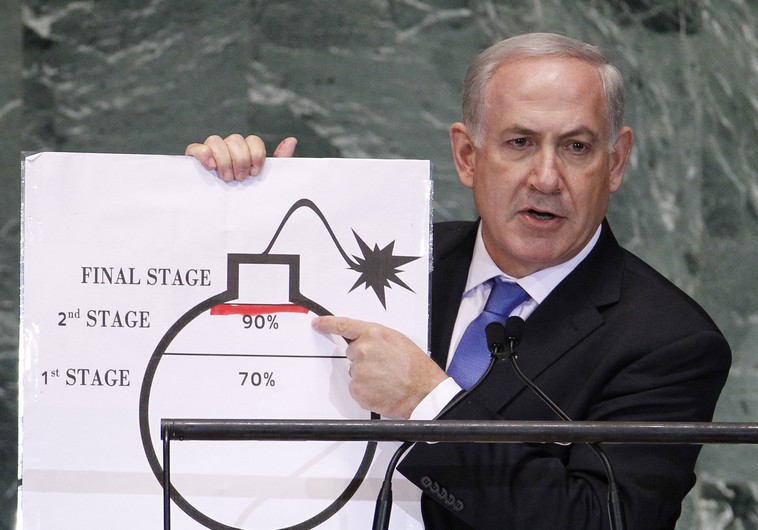Israel: Is the Islamic Republic a greater danger than ISIS?
Majid Rafizadeh /Al Arabiya
Friday, 3 October 2014
The political posturing between the Islamic Republic and Israel has been mounting in recent weeks. Speaking at the U.N. General Assembly, Israeli Prime Minister Benjamin Netanyahu pointed out that if Iran is armed with a nuclear bomb, it would pose the “gravest threat to us all.” Israel’s prime minister added that defeating the Islamic State of Iraq and Syria and leaving the Islamic Republic on the side is akin to “win[ning] the battle and los[ing] the war.”
In response, according to Fars News Agency, Iran’s deputy ambassador to the United Nations, Khodadad Seifi, rejected Israel’s accusations as baseless and stated: “The remarks made by the Israeli regime’s premier include baseless allegations against the Islamic Republic of Iran and are basically made with the aim of… justifying the crimes the regime recently committed against Palestinian civilians.”
“Recent developments reflect escalating Israeli fear and anxiety regarding the Islamic Republic”
More recently, Netanyahu accused the Islamic Republic of being behind a cyber-attack. While addressing the fourth international cyber security conference at Tel Aviv University, he stated: ”I want to make clear that the party behind the cyber-attacks against Israel is first and foremost Iran.”
The zero-sum game
The recent developments reflect escalating Israeli fear and anxiety regarding the Islamic Republic. Nevertheless, there exist several underlying reasons behind Israel’s mounting fear and an Iran-Israel standoff.
First of all, it is critical to point out that the relationship between Israel and the Islamic Republic takes on a distinct character of exclusiveness. From the perspective of Iran’s Supreme Leader Ayatollah Ali Khamenei, and Israel’s Prime Minister Benjamin Netanyahu, the geopolitics between Tehran and Tel Aviv is a zero-sum game. In other words, if the Islamic Republic or Israel gain any political, economic, strategic, or geopolitical points in their interests, the other nation would inevitably come out as the loser.
As a result, from the Israeli government’s standpoint, the recent developments in Iran’s foreign policy and its relationships with the international community (particularly with the West), have placed the Israeli government on the losing side of the equation.
Iran’s geopolitical and strategic ties with the West, more specifically with the United States, have begun to grow stronger. The rise of the Islamic State has provided the Islamic Republic with a unique geopolitical and strategic opportunity to depict itself as an integral state player, as well as a credible partner for the Western coalition, to defeat the Islamic State.
Several bilateral and multilateral talks have been held between world powers and the Islamic Republic to plot a joint strategy to remove the Islamic State’s fighters from Iraq and Syria. In addition to the sideline diplomacy and talks between Iranian and American officials, Iran and Britain are discussing Iran’s assistance and cooperation to battle the Islamic State. The bilateral talks, at this level, are the first since the 1979 Islamic Revolution and mark a historic diplomatic initiative between Britain and the Islamic Republic. Thanks to the rise of ISIS, the recent warming of relations between the Islamic Republic and the West has ratcheted up Israel’s fear and anxiety.
Iran wields considerable political and military influence in Iraq and Syria, which is extremely crucial for the West when it comes to charting a plan to defeat ISIS. In addition, while the West is dominant and superior in aerial assaults on ISIS in Iraq and Syria, it lacks military forces on the ground. Iran’s Revolutionary Guard Corps can provide the West with this missing element of the equation.
Israel’s mounting fear: Threshold nuclear state
Israeli leaders fear that Iran’s improving ties with the United States and other European powers would lead the West to take a softer stance towards Iran’s nuclear program in the ongoing nuclear negotiations.
Isreali leaders have long claimed that the Islamic Republic has to dismantle its centrifuges and nuclear facilities for the international community to make sure that Iranian leaders will not reach the breakout capacity of developing nuclear weapons.
On the other hand, the latest diplomatic headways and developments between the P5+1 (China, France, Germany, Russia, the United Kingdom, and the United States) and the Islamic Republic, reveal that the six world powers appear to be willing to allow Iran to maintain some of it nuclear infrastructure and keep approximately 5000 of its centrifuges, which can be used to enrich uranium.
Israel has been looking for the dismantlement of the centrifuges and Iran’s nuclear program, while the six world powers appear to be willing to settle for a disconnect rather than the dismantling of the whole nuclear program of the Islamic Republic. Intriguingly, only a day before Rowhani gave his speech at the U.N. General Assembly, Intelligence Minister Yuval Steinitz revealed classified documents stating that the site of Parchin in Iran has been utilized to test nuclear implosions.
Israel fears that a disconnection rather than dismantlement would situate the Iranian government on a nuclear threshold status; a technical short step away from the breakout nuclear capacity of becoming a nuclear state. In other words, the Islamic Republic would be akin to other “threshold nuclear states” such as Japan and Brazil.
As the deadline for the final nuclear deal between the P5+1 and the Islamic Republic becomes closer, and as the world powers appear to be softening their demands on Iran’s nuclear capabilities, Netanyahu’s fear in the signing of a final nuclear deal and his objective is to postpone this process between Iran and six world powers.




















